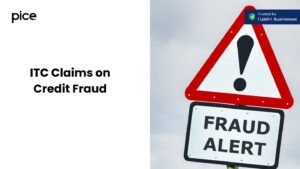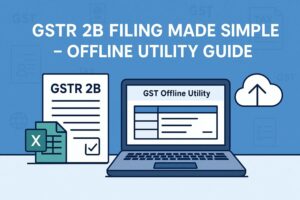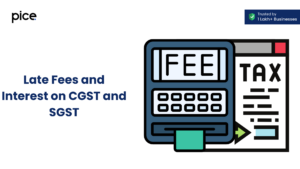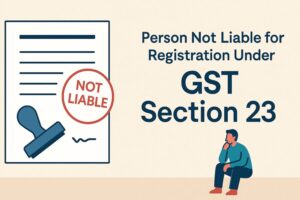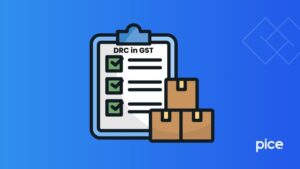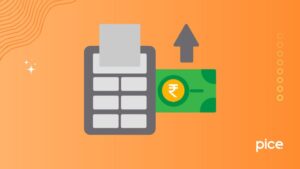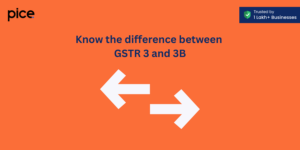ITC Eligibility Criteria Under GST
- 29 Aug 24
- 10 mins
ITC Eligibility Criteria Under GST
- What Is Input Tax Credit (ITC) Under GST?
- Who Is Eligible to Claim Input Tax Credit Under GST?
- Requirements to Claim An Input Tax Credit Under GST
- Deadline For Claiming An Input Tax Credit Under GST
- Items Excluded from ITC
- Special Circumstances to Claim ITC
- Effective Methods to Claim Accurate And Full ITC
- Steps to Claim Input Tax Credit Under GST
- Input Tax Credit – Reversal Process
- Required Documentation
- ITC Reconciliation Process
- The Bottom Line
Key Takeaways
- Input Tax Credit (ITC) under GST helps businesses reduce their tax liability by allowing them to claim taxes paid on goods and services purchased.
- Only registered businesses under GST can claim ITC, while unregistered persons and those opting for the composition scheme are ineligible.
- To claim ITC, a registered person must have a valid tax invoice, receive the goods and services, and ensure taxes are paid to the government.
- Certain items, such as personal expenses and goods used for non-business purposes, are excluded from ITC claims.
- ITC claims must be made before the earlier of 30th November of the subsequent year or the due date of filing the annual GSTR-9 return.
Input tax credit (ITC) is one of the core elements of the Goods and Services Tax (GST) regime. It not only helps eliminate the cascading effect of taxation but also helps reduce the operating cost of a business. However, there are eligibility criteria applicable to claim ITC. Learn about the eligible and ineligible input tax credit criteria, the documents required and the conditions when you can claim input tax credit.
What Is Input Tax Credit (ITC) Under GST?
GST Input Tax Credit is the tax that a registered business or person pays on goods and services purchased under the Act, of 2017. Registered businesses include manufacturers, suppliers, e-commerce operators and other businesses mentioned in the legislation.
ITC helps businesses reduce their tax burden or liability on the supply of goods. For instance, if a manufacturer pays ₹5,000 as input tax on the purchase of goods and services and collects ₹7,000 as output tax on product sales, the manufacturer reduces GST liability by ₹2,000.
Who Is Eligible to Claim Input Tax Credit Under GST?
Here are the eligible and ineligible input tax credit criteria that you need to know:
- An unregistered person under GST is not eligible to claim input tax.
- A person who opts for the composition scheme is not eligible for an ITC claim.
- ITC on inward supply of inputs and capital goods and services can be claimed by a registered person under GST.
Requirements to Claim An Input Tax Credit Under GST
Under Section 16 of the GST Act, registered persons can claim ITC for goods and services purchased. Here are the requirements to claim ITC under GST:
- A registered person needs to possess a valid tax invoice or debit note that a registered supplier issues.
- The registered person should receive goods and services.
- It must be ensured that the collected taxes are paid to the government in cash or with the utilisation of input tax credit.
- The registered person should file GST returns.
- You can claim ITC after receiving the last instalment or lot.
- If the recipient cannot pay the supplier within 180 days from the date of purchase invoice, the ITC amount will be deemed output tax liability and interest will be charged.
- Under the Income Tax Act 1961, any depreciation claimed on the tax component of capital goods will not be eligible for ITC claims.
- After the GST return filing due date, ITC claims are restricted in accordance with the time limit set by GST provisions.
- Common credits used for business or non-business activities or taxable or exempt supplies should be identified and separated.
- Blocked credits under Section 17(5) of the CGST Act are ineligible for ITC claims.
Deadline For Claiming An Input Tax Credit Under GST
There is a specific due date or time limit to claim input tax credit. You can claim ITC on the following due dates, whichever is earlier:
- 30th November of the subsequent year
- The last date of filing the annual GSTR-9 return form, which is 31st December
For instance, a registered person wants to claim ITC for the financial year 2021-2022. Then, the person must claim before 30th November 2022 or by the due date of filing the annual return for 2021-2022, whichever is earlier.
💡 If you want to pay your GST with Credit Card, then download Pice Business Payment App. Pice is the one stop app for all paying all your business expenses.
Items Excluded from ITC
There are certain items excluded from the input tax credit details. Here is the list of items excluded from input tax credit claim:
- Motor vehicles and conveyances, unless these are used for transportation of passengers and goods, training purposes and supply of goods
- Outdoor catering services, food and beverages, health services, beauty treatment, plastic and cosmetic surgery. However, if you use these for making outward taxable supply or a composite supply or mixed supply for furtherance of business, they will be considered.
- Membership fees of a club, fitness or health centre
- Cab rental, health insurance and life insurance, unless they are mandatory for employers to provide to the employees.
- Travel concessions or travel benefits for employees on vacation
- Work contract services when it is supplied for the construction of a property that is immovable unless it is an input service for further supply
- Goods and services except plants and machinery that a taxable person receives for the construction of an immovable property
- Goods and services availed by a non-resident taxable person, except for those on which interstate GST is applicable
- Credit of tax paid on goods and services under the composite scheme
- Goods and services that you use for personal consumption
- Samples or gifts deemed as goods lost, destroyed, stolen, written off or disposed off
- Credit of tax paid for short payment, excessive refund, misdeclaration, fraud, confiscation and suppression
- Goods and services supply exempt from GST
Special Circumstances to Claim ITC
There are some special circumstances in which you may claim ITC under Section 18 of the CGST Act, some of these circumstances are discussed below.
- In the case of compulsory registration
- Instance of voluntary registration
- When a registered person ceases to apply for the composition scheme
- If exempt supplies become taxable
- When there is a constitutional change
Effective Methods to Claim Accurate And Full ITC
There are multiple conditions to claiming ITC before the due date. A business in India needs to verify the ITC details before they claim it in Form GSTR-3B for a period of tax. Additionally, the business needs to ensure frequent follow-ups with the supplier issuing tax invoices or debit notes. Considering the conditions can help businesses claim accurate and full ITC for a definite tax period.
Steps to Claim Input Tax Credit Under GST
Here are the steps on how to claim input credit under GST that you need to follow with due diligence in order to have a seamless experience:
Step 1: Log in to the official GST portal and navigate to the ‘Services’ option. Find ‘Returns’ and ‘ITC Forms’ and click on it as your first step.
Step 2: Look for the 'GST ITC-01' tab and click on ‘Prepare Online’.
Step 3: Choose the relevant section from the option 'Claim Made Under’ drop-down menu.
Step 4: Enter details such as GSTIN, invoice number, invoice date, goods type, description of inputs, unit quantity code, quantity, value and the ITC claimed as central tax, state or UT tax, integrated tax and cess as applicable. Further, click on the ‘Add’ button to proceed.
Step 5: Click on 'Save' followed by the 'Preview' button to view the draft of GST ITC-01.
Step 6: Click the 'Submit' button to complete the process.
Input Tax Credit – Reversal Process
Take a look at the following situations that generally result in the reversal of ITC:
- Invoice non-payment within 180 days: If payment of invoices is due beyond 180 days from the date of invoice issuance, your ITC will be reversed.
- Seller issues credit note to Input Service Distributor: If a seller issues a credit note to the input service distributor, the reduced ITC gets reversed.
- Inputs or raw materials used partly for business and partly for exempted services or personal use: The portion of input used for personal use and exempted services gets reversed, if inputs are proportionately used for business and non-business (personal use) purposes.
- Capital goods used partly for business and partly for exempted services or personal use: The portion of capital goods used for personal purposes or exempted services results in ITC reversal.
- Insufficient ITC reversal: The difference between ITC on inputs used for non-business purposes and the ITC reversed during a financial year, gets added to the output liability. Further, it will attract additional interest for the amount of difference.
The reversed ITC reflects on form GSTR-3B which you can refer to understand the details.
Required Documentation
Here is the list of documents that you require for ITC claims:
- Invoice that supplier of goods and services issue
- Debit note that the supplier issues to the recipient
- Bill of entry
- Invoice issued under special circumstances. The special circumstances may include the issuance of a bill of supply instead of a tax invoice when the amount does not exceed ₹200. It may further include reverse charge, if applicable under the GST law.
- A credit note or invoice that an input service distributor issues as per the GST norm
- Bill of supply that a supplier of goods and services issue
ITC Reconciliation Process
The details that suppliers provide in their GST return and the input tax credit claims by a person must align. In the case where there are discrepancies, both supplier and recipient will receive notifications for reconciliation of the ITC claim in form GSTR-3B.
The Bottom Line
Now that you know the eligible and ineligible input tax credit criteria, ensure you do not claim ITC credits for the supply of goods and services used for non-business purposes or personal use. Further, ensure that you have all the documents required in order to claim your ITC for a tax period. In case of any discrepancy, ensure you reconcile ITC claims after a prior discussion with the supplier.
 By
By 






